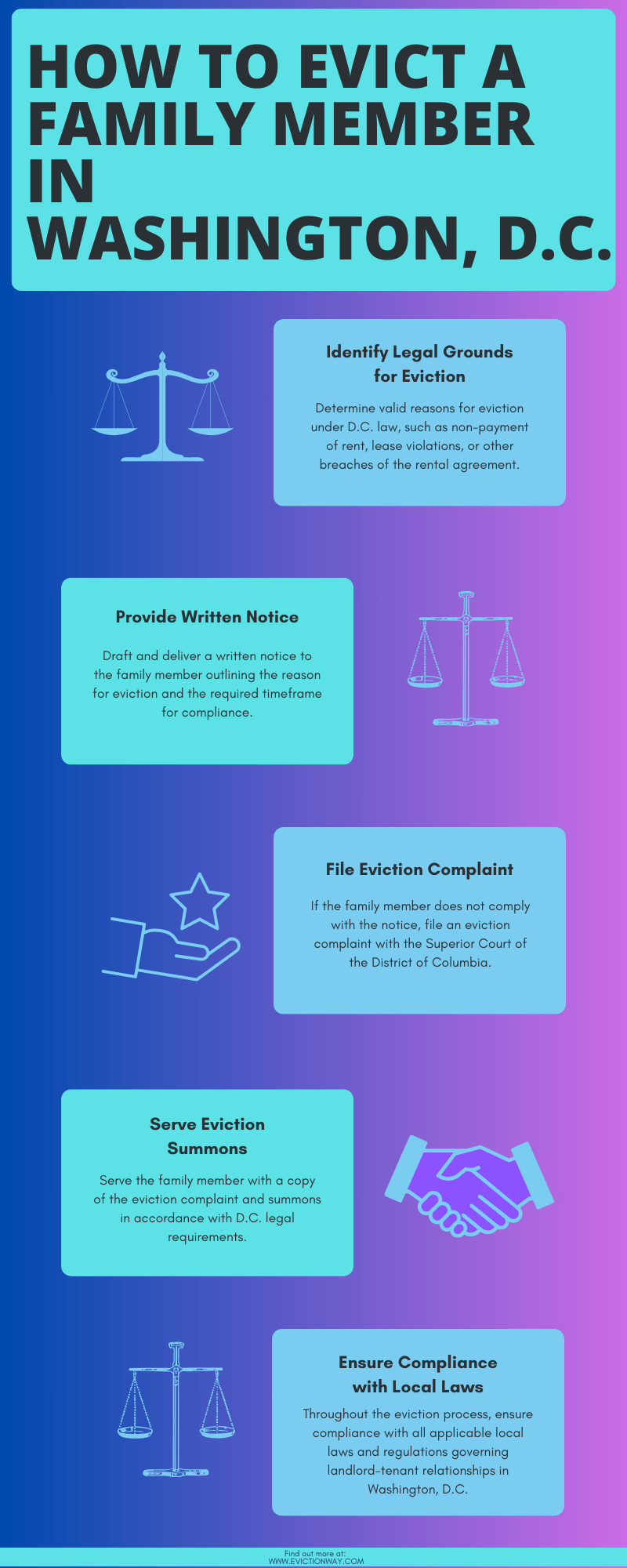Are you facing the difficult decision of evicting a family member in Washington, D.C.? This can be a complex and emotional process, but it’s important to know your options and proceed legally. In this blog post, we’ll guide you through the steps involved in evicting a family member in the District of Columbia.
First, let’s talk about the legal process. In Washington, D.C., you must follow specific procedures to evict a family member. This includes providing proper notice, filing a complaint with the court, and attending a hearing. We’ll provide you with a step-by-step guide to help you navigate the legal system and ensure that your rights are protected.

We understand that evicting a family member can be emotionally challenging. That’s why we’ll also share tips on how to approach the situation with empathy and respect. We’ll discuss ways to communicate your decision effectively, minimize conflict, and protect your own well-being throughout the process.
How To Evict a Family Member In Washington, D.C.
Evicting a family member is never easy, but it may be necessary to protect your rights and property. If you’re a landlord in Washington, D.C., and you need to evict a family member, here’s what you need to know.
1. Give Proper Notice
The first step is to give your family member proper notice to vacate the property. In Washington, D.C., you must give at least 30 days’ written notice for a month-to-month tenancy and 60 days’ written notice for a year-to-year tenancy.
2. File a Complaint with the Court
If your family member does not vacate the property after you give them notice, you will need to file a complaint with the Landlord and Tenant Branch of the D.C. Superior Court. The complaint must include the following information:
- Your name and address
- Your family member’s name and address
- The address of the property
- The reason for the eviction
- A copy of the notice you gave your family member
3. Serve the Complaint
Once you have filed the complaint, you will need to serve it on your family member. You can do this by having a process server deliver the complaint to your family member in person or by mailing the complaint to your family member’s last known address.

4. Attend the Hearing
After you have served the complaint, a hearing will be scheduled. At the hearing, you will have the opportunity to present your case to the judge. Your family member will also have the opportunity to present their case.
5. Get a Judgment
If the judge rules in your favor, you will be granted a judgment for possession of the property. This judgment will give you the right to evict your family member from the property.
6. Enforce the Judgment
To enforce the judgment, you will need to hire a U.S. Marshal. The U.S. Marshal will evict your family member from the property and return possession of the property to you.
How Much Does it Cost to Evict a Family Member in Washington, D.C.?
Evicting a family member from your property can be a difficult and expensive process. The cost of eviction will vary depending on the specific circumstances of your case, but you can expect to pay several hundred dollars in court fees and attorney fees.
| Description | Estimated Cost (USD) | Notes |
|---|---|---|
| Filing Fee for Landlord and Tenant Branch | $15 | Cost for filing a complaint with the Landlord and Tenant Branch of the D.C. Superior Court. |
| Service of Process Fee | $75 – $100 | Cost to have the eviction notice officially served by a process server. |
| Legal Representation (Attorney Fees) | $500 – $10,000 | This varies greatly based on experience and the complexity of the case. |
| U.S. Marshal Service for Eviction | $0 | In D.C., the U.S. Marshals conduct the eviction, and there is currently no fee charged for this. |
| Locksmith Services (if needed) | $160 | To change the locks after the tenant is evicted, if necessary. |
| Storage Fees (if required) | Varies | Costs to store the tenant’s personal property after an eviction, per D.C. regulations. |
In addition, you may also have to pay for the costs of serving the eviction notice, changing the locks, and cleaning the property.If you are considering evicting a family member, it is important to speak to an attorney to discuss your options. An attorney can help you understand the eviction process and can represent you in court.

FAQs: Evicting a Family Member in Washington, D.C.
Evicting a family member can be a difficult and emotional process. However, it is important to remember that you have rights as a landlord, and you may need to take legal action to protect your property.
Here are some of the most frequently asked questions about evicting a family member in Washington D.C.:
What are the grounds for evicting a family member in Washington, D.C.?
There are several grounds for evicting a family member in Washington, D.C., including:
- Nonpayment of rent
- Violation of the lease agreement
- Causing damage to the property
- Engaging in illegal activity
- Threatening or harassing other tenants
What is the process for evicting a family member in Washington, D.C.?
The process for evicting a family member in Washington, D.C. is as follows:
- Serve the tenant with a notice to quit.
- File a complaint with the D.C. Superior Court.
- Attend a hearing.
- If the court rules in your favor, the tenant will be ordered to vacate the property.
Can I evict a family member without going to court?
In some cases, you may be able to evict a family member without going to court. However, this is only possible if the tenant agrees to leave the property voluntarily.

What are the resources available to help me evict a family member in Washington, D.C.?
There are several resources available to help you evict a family member in Washington, D.C., including:
- The D.C. Bar Pro Bono Center
- The Legal Aid Society of the District of Columbia
- The D.C. Office of the Tenant Advocate
What should I do if I am being threatened or harassed by a family member who is living with me?
If you are being threatened or harassed by a family member who is living with you, you should contact the police immediately. You may also want to consider filing a restraining order.
Related:
How to Evict a Family Member in Edison
